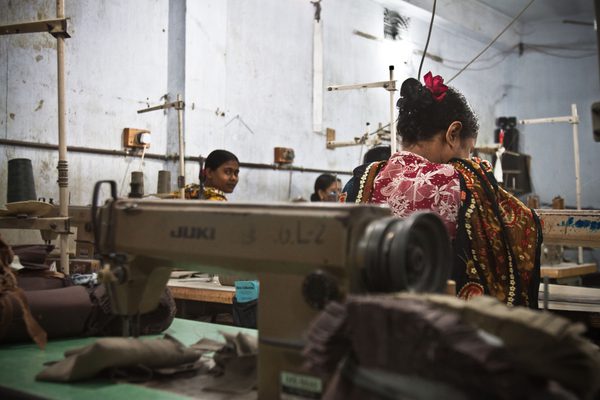The Global Migration Compact and the Role of Business
7 June 2022
On May 17, UN member-state delegates and key stakeholders met at the United Nations Headquarters in New York City to debate the implementation of the Global Compact for Safe, Orderly and Regular Migration. This historic document outlines a shared vision for tackling the global migration crisis and delineates 23 overarching objectives that, if fully embraced in policy and practice, would provide safety and protection for all types of immigrants.
The International Migration Review Forum, hosted by the President of the UN General Assembly, aimed to mobilize further collective action on safe migration and ended with the adoption of a formal Progress Declaration – to be published soon. As delegates reaffirmed their commitment to the Compact, Antonio Guterres, the UN Secretary-General, said, “we must do more to expand and diversify rights-based best practices for migration to advance the Sustainable Development Goals and address labour market shortages.”
With labour migration a major theme of the week, Achim Steiner, the Administrator of the UNDP, called labour migrants a “source of prosperity”, who generate a vital economic lifeline to low- and middle-income countries. Indeed, 2021 remittances totaled $589 billion and such financial flows offer greater direct stability to struggling communities and families than international aid packages. The Progress Declaration makes clear reference to the importance of remittances and the recent positive changes made to how remittances are sent. The draft Declaration notes that section 42 and 43 note that, during the pandemic, remittances were declared “essential services” and several institutions waived transaction fees or offered easier solutions for transfer of funds. It also notes that, while there have been innovative solutions regarding digital platforms and financial inclusion, many migrants, especially women, still do not have adequate access to digital remittance channels.
The UN Secretary-General, said, “we must do more to expand and diversify rights-based best practices for migration to advance the Sustainable Development Goals and address labour market shortages.”
Yet, in the remittances saga, focusing solely on the needs of workers in the host country is but one half of the equation. Workers’ risk of being exploited or abused, especially in non-elite sectors, begins within their country of origin, beginning with recruitment. The IHRB paper, Realising Rights and Maximising Benefits: Improving Development Outcomes through the Responsible Recruitment of Migrants, further outlines the irrefutable link between the right for safe labour migration and the positive outcomes for host and origin countries. When recruitment is unregulated, individuals may be charged fees which can deter or completely undermine their ability to send money home. This can lead to a cascading series of rights violations and increase suffering both for the worker themselves and for those at home relying on their remittances.
Migrant workers also provide vital labour in host countries which suffer from labour or skill shortages. During the Informal Multistakeholder Hearings on May 16, speakers repeatedly highlighted the benefit that migrant workers can bring within host countries. Jill Goldenzeil, representing the Academic Council on the United Nations Systems, spoke of the damage wrought by the COVID-19 pandemic, and the importance that migrant workers can play in the rebuilding and repairing process, especially when offered sector or skill-based migration visa pathways. Not only can migrant skills address urgent labour shortages, but they can also offer a possible solution to irregular migration if the visa scheme meets international standards.
[In] 2021 remittances totaled $589 billion and such financial flows offer greater direct stability to struggling communities and families than international aid packages.
The private sector also has a critical role to play within the implementation of the Compact and can use their global, national, and local influence to build stronger protections for migrant workers. As outlined in the Progress Declaration, there have been positive developments in building stronger collaboration between government and business, and section 25 of the Declaration distinctly recognizes the private sector’s promotion of “fair and ethical recruitment and decent work for migrant workers, international labour standards, ensuring respect for and protection and fulfilment of human rights, and reducing or banning recruitment fees and strengthening labour inspection capacities.” Business and trade representatives spoke to the aligned interests between government and the private sector in ensuring stronger protections for workers. Juliana Manrique, the Director Labour, Asociación Nacional de Empresarios de Colombia, called for four specific, critical policy changes that business would like to see implemented:
- Predictable and reliable legal frameworks with clear and transparent laws allowing workers to move when and where they are most needed;
- Including remote and digital work into legal frameworks which allow for the flexibility desired by business;
- Responsible recruitment policies; and,
- The use of technology and digital innovative solutions for labour migration pathways, specifically for labour applications and visas.
As States continue to drive forward, diligence is needed to ensure the Compact reaches its fullest impact. As Abdulla Shahid, President of the 76th session of the UN General Assembly and chair of the International Migration Review Forum, said, “… we have an opportunity to breathe life into that text. To act upon its provisions and realize their concrete benefits.”
The IHRB paper, Realising Rights and Maximising Benefits: Improving Development Outcomes through the Responsible Recruitment of Migrants, further outlines the irrefutable link between the right for safe labour migration and the positive outcomes for host and origin countries.
To do so, during an intervention from the floor of the Informal Multistakeholder Hearing, I spoke on the essential component that civil society and workers can have when designing policy and its implementation and called on business and government to recognize the urgency of the migration crisis due to the climate crisis, poverty, conflict, and war. I also called on businesses “to take a leadership role in advocating for the prohibition of recruitment fees charged to workers and apply human rights due diligence across their supply chains to expose exploitation and abuse.” Our other call was to all governments “to apply a development lens to policies and legislation and labour migration governance.” And concluded: “We support and believe that open pathways for migration mobility and state labour migration visa schemes, when they meet international human rights standards, hold a key to migration with dignity and can play an integral part in the implementation of the Global Migration Compact and movement towards meeting key components of the SDGs.”




